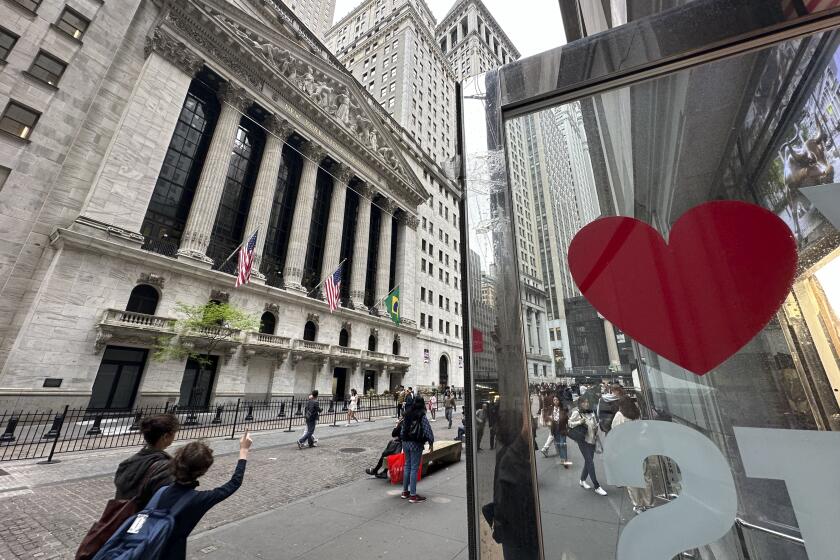Japanese Challenge Wall Street : 1987 Will Test American Supremacy in Financial Services
Contrary to popular belief, Wall Street’s biggest story of 1986 had nothing to do with Ivan F. Boesky.
A decade from now, 1986 will be remembered as the year the Japanese arrived on Wall Street issuing the same challenge to American supremacy in financial services that was previously witnessed in the auto, steel and consumer-electronics industries. A watershed event took place this month, although few American bankers and brokers took much notice: The U.S. units of Nomura Securities Co. and Daiwa Securities Co. were granted the “primary dealerships” that they had long coveted to handle U.S. government securities.
The decision by the Federal Reserve Bank of New York to confer such prestigious status on Japanese institutions confirms an alarming reality: Japanese brokerage houses routinely buy as much as one-third of new U.S. Treasury issues. Nomura is probably the world’s top salesman of U.S. government obligations. Without the Japanese to soak up the huge oversupply of American debt, our interest rates would be soaring back into double digits and our budget deficit would be the center of an apocalyptic political crisis.
On the other hand, American financial institutions are having a frustrating time cracking Tokyo’s bulging money markets. Rep. Charles E. Schumer (D-N.Y.) has suggested linking the award of primary dealerships to progress in opening Japanese markets to American firms. This is the kind of forethought needed to prevent repetition of the disastrously one-sided patterns in other transpacific business relationships of late. But the Federal Reserve decided to ignore Schumer’s suggestion, awarding the primary dealerships while expressing the hope that Tokyo will respond in kind afterward.
Such hope is naive--akin to undertaking unilateral disarmament as a way of encouraging the Soviets to do the same.
Naivete about the Japanese is running high these days on Wall Street, where many otherwise pragmatic thinkers believe that American domination of world money markets will continue forever. The Japanese, they say, aren’t good enough at risk-taking and innovating to ever unseat Americans as the heavy hitters in the $30-trillion-a-year global-financial-services industry. Oh no? Consider some of the developments of 1986:
--Japan emerged as the world’s leading creditor nation, replacing the United States, which has now become a net debtor.
--According to the American Banker, the four biggest banks in the world today are all Japanese: Dai-Ichi Kangyo, Fuji, Sumitomo and Mitsubishi. It was only a few years ago that Citibank, Chase and Bank of America headed the list. Today Citibank is fifth, the lone American institution in the top 10. Six of the 10 are Japanese.
--Nomura, the world’s biggest securities firm, doubled the size of its New York office in the last year, and vowed to compete head on with the biggest American financial-service firms.
--Sumitomo Bank plunked down $500 million for a chunk of Wall Street’s most blue-chip investment-banking firm, Goldman Sachs.
--Japanese banks now control nearly 10% of the entire U.S. banking market--up from next to nothing just five years ago.
--In the wake of the Reagan Administration’s efforts to drive the yen into the stratosphere, the new yen-dollar relationship has created a virtual “40%-off sale” for Japanese investors scouting American properties this year. Japanese real-estate interests pumped about $5 billion into the United States during 1986, acquiring such flagships as Arco Plaza in Los Angeles ($620 million) and more than a billion dollars worth of hotels and beaches in Hawaii.
--Japanese financial firms are hiring top local talent to direct their operations abroad. Nikko Securities lured Stephen H. Axilrod away from his long career under Paul A. Volcker at the Fed. In London, where October’s “Big Bang” threw the financial world open to the highest bidder, Nomura says that it hired more new graduates of Oxford and Cambridge than any employer except the British government.
--Japanese banks are moving toward a monopoly in the mushrooming letter-of-credit business that enables American municipalities to promise investors that there will be a liquid market in their bonds. These kinds of bonds need to be backed by a guarantor with a triple-A rating. Most top Japanese banks have that, while only one American bank still does.
--With a twentyfold increase over the last two years in the market for yen-dominated bonds, where more than $7 billion worth of yen was lent to corporations and governments in 1986, Japan appears ready to allow the yen to compete with the dollar as the world standard. Indeed, a top spokesman for the Industrial Bank of Japan recently suggested that the U.S. Treasury ought to begin issuing U.S. government bonds in yen.
Is Wall Street going the way of Detroit and Silicon Valley in the face of Japanese competition? 1986 was the year that set such a scenario into motion. In 1987 we will find out if anyone on this side of the Pacific intends to do anything about it.






